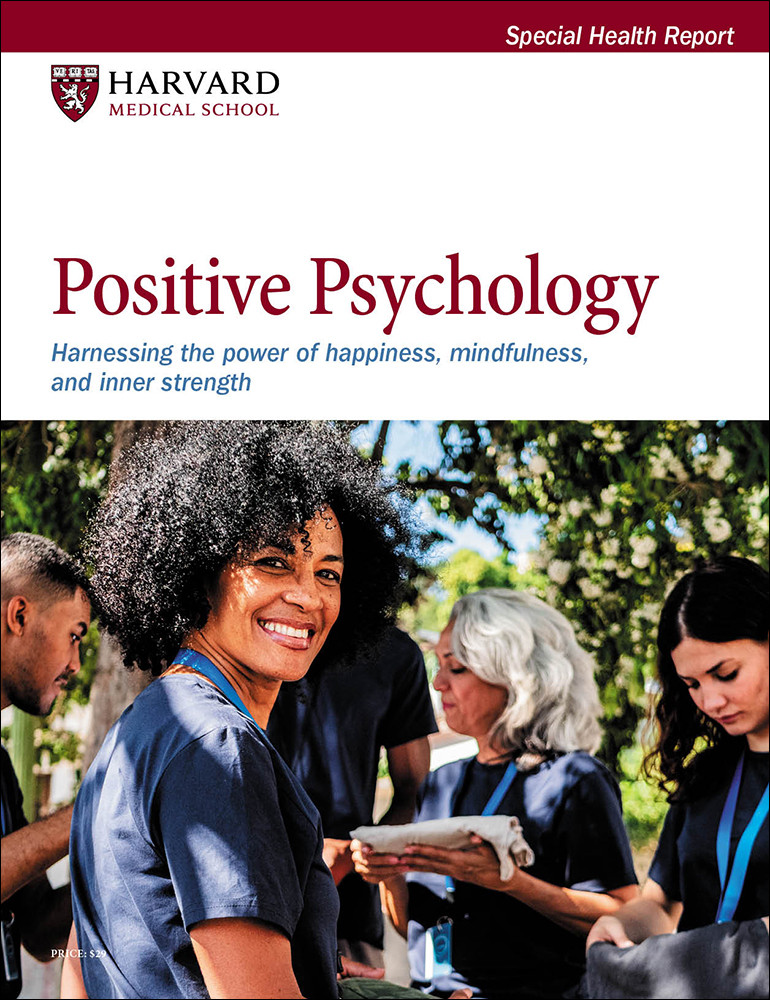Want more happiness? Try this
Three well-tested ways to add more happiness to your day.
- Reviewed by Howard E. LeWine, MD, Chief Medical Editor, Harvard Health Publishing; Editorial Advisory Board Member, Harvard Health Publishing

Be positive. Find your joy. Happiness is a choice we make.
Even if you're rolling your eyes at these words, you might still be seeking to lighten your load and feel, well, happier, day to day. Below we offer three easily applied physical and emotional strategies from the field of positive psychology that could help you head in the right direction.
Choose the happiness option that appeals most or seems easiest first. Try each one for a week. Then assess whether one or more of these steps increased your daily happiness quotient — and keep doing it!
Get out and get active
Fresh air and exercise is a powerful mood-lifting combination. Walking, biking, running, and other aerobic activities release mood-boosting hormones that can reduce stress and confer a sense of well-being.
Also, when your muscles contract in a repetitive pattern, as they do when you are walking, swimming, or doing activities such as yoga, it bumps up levels of a brain chemical called serotonin, one of four key feel-good hormones. Higher levels of serotonin are associated with better mood. In fact, one study found that just 90 minutes a week of activity provided mood improvements similar to an antidepressant. When combined with medication, exercise can even help mood disorders that have been resistant to other treatments.
How much movement should you strive for? Ideally, aim for at least 30 minutes of moderate-intensity exercise five days a week, or a vigorous 20 minutes three times a week. But if you can't do that much, remember that some is always better than none. Even a quick 10-to-15-minute walk can elevate your mood, at least in the short term. Bonus points if you find a park or hiking trail to enjoy your walk since time spent in greenspace is a mood-booster, too.
Dive into small daily pleasures
Little annoyances can spoil the best day — you misplace your keys, stub your toe, or encounter a grouchy coworker. But the reverse is true as well. Studies show that taking the time to appreciate small, pleasurable moments can make you feel happier.
So, focus on small daily events the same way you would big ones like a wedding day, the birth of a child, or a relaxing vacation. After all, it's those little moments that make up most of your life.
Savor time spent gardening (yes, potted plants count) or sitting in a sunny window with a cup of fragrant tea. Crank up energizing music. Laugh with family or friends over a good meal. Crawl under soft blanket with a good book or podcast to enjoy. Also, celebrate tiny milestones and achievements, a project well done, or a daily goal met. Make a conscious effort to pause and enjoy small pleasures like these every day.
Lighten the heavy burden of choice
It may sound like a dream to have endless options, but in truth having lots of choices can generate more worry. Happiness does depend partly upon choices — after all, it would be highly stressful not to have any control over your life.
However, research has found that people given more options have more opportunity for regret. Do you wish you'd chosen a different insurance carrier, outfit, cellphone plan, dessert? Would another selection have been better? This is why people who run meditation or spiritual retreats often limit selections. Not having to make numerous decisions all day long can be freeing.
A simple exercise can help you ease the choice burden. Decide that if a decision won't bring major consequences, you'll limit the amount of time you give yourself to pick, or you'll give yourself fewer options. Don't allow yourself to second-guess the decision once it's made. Save the heavy deliberations for bigger, more consequential issues. However, even when making these choices, try to avoid looking back.
Harvard Health Publishing would like to acknowledge Kelly Bilodeau, who wrote the original version of this post.
About the Author

Harvard Health Publishing Staff
About the Reviewer

Howard E. LeWine, MD, Chief Medical Editor, Harvard Health Publishing; Editorial Advisory Board Member, Harvard Health Publishing
Disclaimer:
As a service to our readers, Harvard Health Publishing provides access to our library of archived content. Please note the date of last review or update on all articles.
No content on this site, regardless of date, should ever be used as a substitute for direct medical advice from your doctor or other qualified clinician.
















